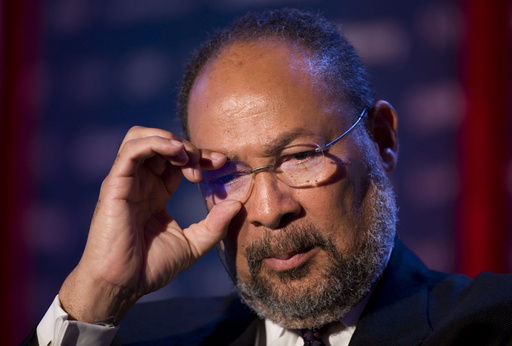
Richard Parsons, a notable figure in American corporate leadership and one of the most distinguished Black executives, passed away on Thursday at the age of 76 in his Manhattan residence. His death was confirmed by Lazard, a financial services firm where he had a long-standing position on the board. Parsons had been living with multiple myeloma since 2015 and had cited health complications as a reason for his reduced work commitments in recent years.
His friend Ronald Lauder informed The New York Times that the cause of death was cancer. Parsons officially resigned from the boards of Lazard and Estée Lauder on December 3, where he had served for 25 years, due to health concerns. Ronald Lauder memorialized him in a statement, praising Parsons as an “American original” who made significant contributions across various sectors, including business, media, culture, and philanthropy.
David Zaslav, the CEO of Warner Bros. Discovery, revered Parsons as a formidable mentor and skilled negotiator who consistently aimed for mutually beneficial outcomes. “Those who had the privilege to work with him recognized his exceptional leadership that was complemented by integrity and kindness,” Zaslav stated, emphasizing Parsons’ reputation as an outstanding problem solver in the industry.
Born in Brooklyn, Parsons began his college education at the young age of 16, eventually carving out a reputation for adeptly guiding major companies through challenging economic climates. His leadership was critical during the global financial crisis, where he successfully maneuvered Citigroup back to profitability, as well as revitalizing Time Warner after the controversial acquisition by America Online.
In September 2018, Parsons joined the CBS board but had to resign shortly thereafter due to his health issues, stating that “unanticipated complications” from his condition necessitated a reevaluation of his commitments for better recovery. Lazard recognized his extraordinary contributions to American business, highlighting his “unmistakable intelligence” and “irresistible warmth,” and affirmed that his enduring legacy will influence many future leaders and institutions he had a hand in shaping.
Parsons was widely recognized for his skills in negotiation and crisis management. While navigating Time Warner’s troubled relationship with AOL, he earned tremendous respect on Wall Street by streamlining the company’s structure, reducing debt, and managing significant sales, including that of Warner Music Group. He also successfully addressed a potential breakup of the company in 2006 at the hands of activist investor Carl Icahn, leading to more stable relationships with investors and regulators.
Ascendancy in Time Warner began for Parsons in 1995 as president, after which he served as chairman and CEO due to his extensive background, including his tenure as chairman and CEO of Dime Bancorp Inc. His leadership peaked during the tumultuous merger with AOL in 2001, but the expected synergies deteriorated with AOL’s declining subscriber base shortly thereafter. Parsons exited as CEO in 2007 and vacated the chairman role in 2008, as AOL separated from Time Warner in 2009.
In addition to his pivotal roles at Citigroup, where he became chairman in 2009 during a period of immense financial stress, Parsons was instrumental in leading the bank back to profitability by 2010, avoiding further quarterly losses until late 2017. He briefly served as interim CEO of the Los Angeles Clippers in 2014 before handing over the reins to Microsoft’s Steve Ballmer.
Parsons prided himself on a noteworthy career that intertwined with politics and economics; he had worked with former New York Governor Nelson Rockefeller and during Gerald Ford’s presidency. His expertise led him to serve as an economic adviser during Barack Obama’s transition period. Beyond his corporate prowess, Parsons had a passion for jazz, co-owning a Harlem jazz club and contributing to significant arts institutions, including the Apollo Theater and the Jazz Foundation of America.
A former basketball player at the University of Hawaii and a law degree graduate from Albany Law School, Parsons is survived by his wife, Laura, and their family. His impact on business, culture, and mentorship will echo throughout the corridors of the organizations and individuals he helped throughout his life.

